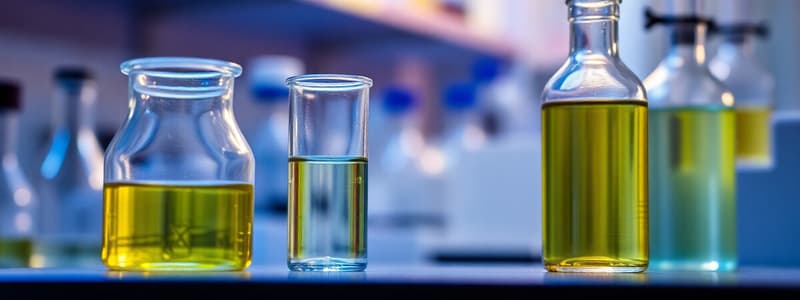Podcast
Questions and Answers
What determines the optimal pH for enzymes?
What determines the optimal pH for enzymes?
- The environment in which it operates (correct)
- The temperature of the surroundings
- The concentration of the enzyme
- The type of substrate it acts on
Which enzyme is known to function optimally in acidic conditions?
Which enzyme is known to function optimally in acidic conditions?
- Trypsin
- Pepsin (correct)
- Amylase
- Lactase
What is the optimal pH range for trypsin to function effectively?
What is the optimal pH range for trypsin to function effectively?
- Neutral to basic conditions (correct)
- Acidic conditions
- Highly acidic conditions
- Highly alkaline conditions
Why might enzymes have different optimal pH levels?
Why might enzymes have different optimal pH levels?
Which of the following enzymes operates best in neutral conditions?
Which of the following enzymes operates best in neutral conditions?
Which statement correctly describes the behavior of pepsin in terms of pH?
Which statement correctly describes the behavior of pepsin in terms of pH?
What is the likely effect of changing the environment of trypsin from neutral to acidic?
What is the likely effect of changing the environment of trypsin from neutral to acidic?
Which statement about enzymes and pH is true?
Which statement about enzymes and pH is true?
Why might pepsin and trypsin require different pH levels to function effectively?
Why might pepsin and trypsin require different pH levels to function effectively?
What occurs to enzyme activity when the pH is not within the optimal range?
What occurs to enzyme activity when the pH is not within the optimal range?
Which enzyme is most likely to denature in highly alkaline conditions?
Which enzyme is most likely to denature in highly alkaline conditions?
What can be inferred about enzymes that function optimally in acidic environments?
What can be inferred about enzymes that function optimally in acidic environments?
Which of the following most accurately describes the relationship between enzyme pH and its environment?
Which of the following most accurately describes the relationship between enzyme pH and its environment?
Which scenario best illustrates the optimal pH conditions necessary for enzyme function?
Which scenario best illustrates the optimal pH conditions necessary for enzyme function?
If an enzyme that typically operates best at a pH of 2 is moved to a pH of 8, what is the likely outcome?
If an enzyme that typically operates best at a pH of 2 is moved to a pH of 8, what is the likely outcome?
Explain how the environment influences the optimal pH of different enzymes.
Explain how the environment influences the optimal pH of different enzymes.
What impact does an enzyme's optimal pH have on its activity?
What impact does an enzyme's optimal pH have on its activity?
Discuss the significance of pepsin and trypsin's differing optimal pH levels in digestion.
Discuss the significance of pepsin and trypsin's differing optimal pH levels in digestion.
Why might an enzyme function poorly if the pH is altered away from its optimal level?
Why might an enzyme function poorly if the pH is altered away from its optimal level?
Identify a potential consequence if an enzyme is exposed to highly alkaline conditions.
Identify a potential consequence if an enzyme is exposed to highly alkaline conditions.
Flashcards
Enzyme pH
Enzyme pH
Enzymes have a specific pH range at which they function optimally.
Optimal pH
Optimal pH
The pH level where an enzyme works best.
Pepsin pH
Pepsin pH
Stomach enzyme pepsin works best in acidic conditions.
Trypsin pH
Trypsin pH
Signup and view all the flashcards
Enzyme environment
Enzyme environment
Signup and view all the flashcards
Enzyme Optimal pH
Enzyme Optimal pH
Signup and view all the flashcards
pH Variations Among Enzymes
pH Variations Among Enzymes
Signup and view all the flashcards
Pepsin and Acidic pH
Pepsin and Acidic pH
Signup and view all the flashcards
Trypsin and Neutral/Basic pH
Trypsin and Neutral/Basic pH
Signup and view all the flashcards
Enzyme Function and Environment
Enzyme Function and Environment
Signup and view all the flashcards
pH and Enzyme Function
pH and Enzyme Function
Signup and view all the flashcards
Pepsin's pH preference
Pepsin's pH preference
Signup and view all the flashcards
Trypsin's pH preference
Trypsin's pH preference
Signup and view all the flashcards
Different enzymes, different pHs
Different enzymes, different pHs
Signup and view all the flashcards
pH Variation for Enzymes
pH Variation for Enzymes
Signup and view all the flashcards
pH's Impact on Enzymes
pH's Impact on Enzymes
Signup and view all the flashcards
Study Notes
Enzyme Activity and pH
- Enzymes have an optimal pH at which they work best.
- Optimal pH varies between enzymes, depending on their environment.
- For example, pepsin (a stomach enzyme) works best in acidic conditions.
- Other enzymes, like trypsin, function optimally in neutral or basic conditions.
- The graph shows the optimal pH for pepsin and trypsin.
Studying That Suits You
Use AI to generate personalized quizzes and flashcards to suit your learning preferences.




